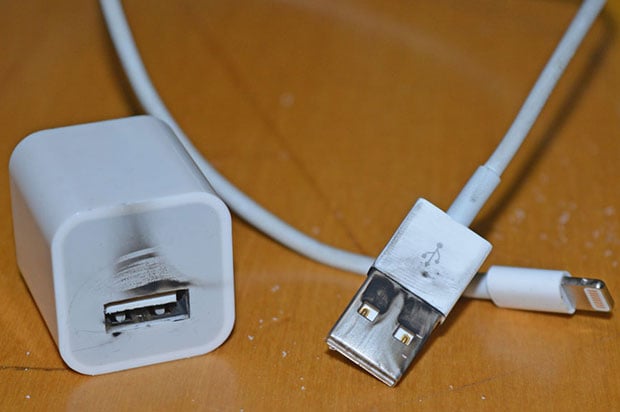U.K. Safety Test Finds 99 Percent Of Counterfeit Apple Chargers Are Dangerous
It can be a punch to gut having to pay a premium price for a genuine accessory from Apple (or any company for that matter). The alternative is to save a few bucks by going with a knockoff or a supposedly certified accessory from a third-party at a discount, but doing so is a gamble. A new study in the U.K. found that almost every single fake Apple charger is a safety hazard.
U.K.'s Chartered Trading Standards Institute commissioned UL safety specialists to purchase 400 counterfeit Apple charges online and test them for any safety risks. Out of all those 400 samples, just three had enough insulation to protect users against electric shocks.

This is a big problem that Apple is actively working solve. The iPhone maker said in October that it had filed a lawsuit against a third-party vendor that was putting customers "at risk" by selling counterfeit power adapters. Apple has also complained that fake chargers are even being sold on Amazon, the world's largest online retailer.
Counterfeit chargers and the safety hazards they present aren't just a problem in one specific area, either. The safety specialists who conducted the testing purchased the chargers from eight different countries, including the U.S., China, and Australia.
"It might cost a few pounds more, but counterfeit and second-hand goods are an unknown entity that could cost you your home or even your life, or the life of a loved-one," said Leon Livermore, chief executive of Charted Trading Standards Institute.
This goes beyond chargers. A separate investigation of a little over 3,000 electrical items determined that 15 percent (around 450) of them were not compliant with safety standards. They come from all over the place, including charity shops, antique dealers, second hand dealers, and so forth.
Fakes can sometimes be tough to spot. One thing to look for is a CE safety mark, though this is something that can be forged. Same goes for the manufacturer's brand name, logo, and batch number. Trading Standards also suggests plugging a purchased charger into socket without using it to make sure it fits easily. Some fake chargers use pins that are the wrong size. If you're able to measure, there should be at least 9.5mm from the edge of the pin.
U.K.'s Chartered Trading Standards Institute commissioned UL safety specialists to purchase 400 counterfeit Apple charges online and test them for any safety risks. Out of all those 400 samples, just three had enough insulation to protect users against electric shocks.

This is a big problem that Apple is actively working solve. The iPhone maker said in October that it had filed a lawsuit against a third-party vendor that was putting customers "at risk" by selling counterfeit power adapters. Apple has also complained that fake chargers are even being sold on Amazon, the world's largest online retailer.
Counterfeit chargers and the safety hazards they present aren't just a problem in one specific area, either. The safety specialists who conducted the testing purchased the chargers from eight different countries, including the U.S., China, and Australia.
"It might cost a few pounds more, but counterfeit and second-hand goods are an unknown entity that could cost you your home or even your life, or the life of a loved-one," said Leon Livermore, chief executive of Charted Trading Standards Institute.
This goes beyond chargers. A separate investigation of a little over 3,000 electrical items determined that 15 percent (around 450) of them were not compliant with safety standards. They come from all over the place, including charity shops, antique dealers, second hand dealers, and so forth.
Fakes can sometimes be tough to spot. One thing to look for is a CE safety mark, though this is something that can be forged. Same goes for the manufacturer's brand name, logo, and batch number. Trading Standards also suggests plugging a purchased charger into socket without using it to make sure it fits easily. Some fake chargers use pins that are the wrong size. If you're able to measure, there should be at least 9.5mm from the edge of the pin.

